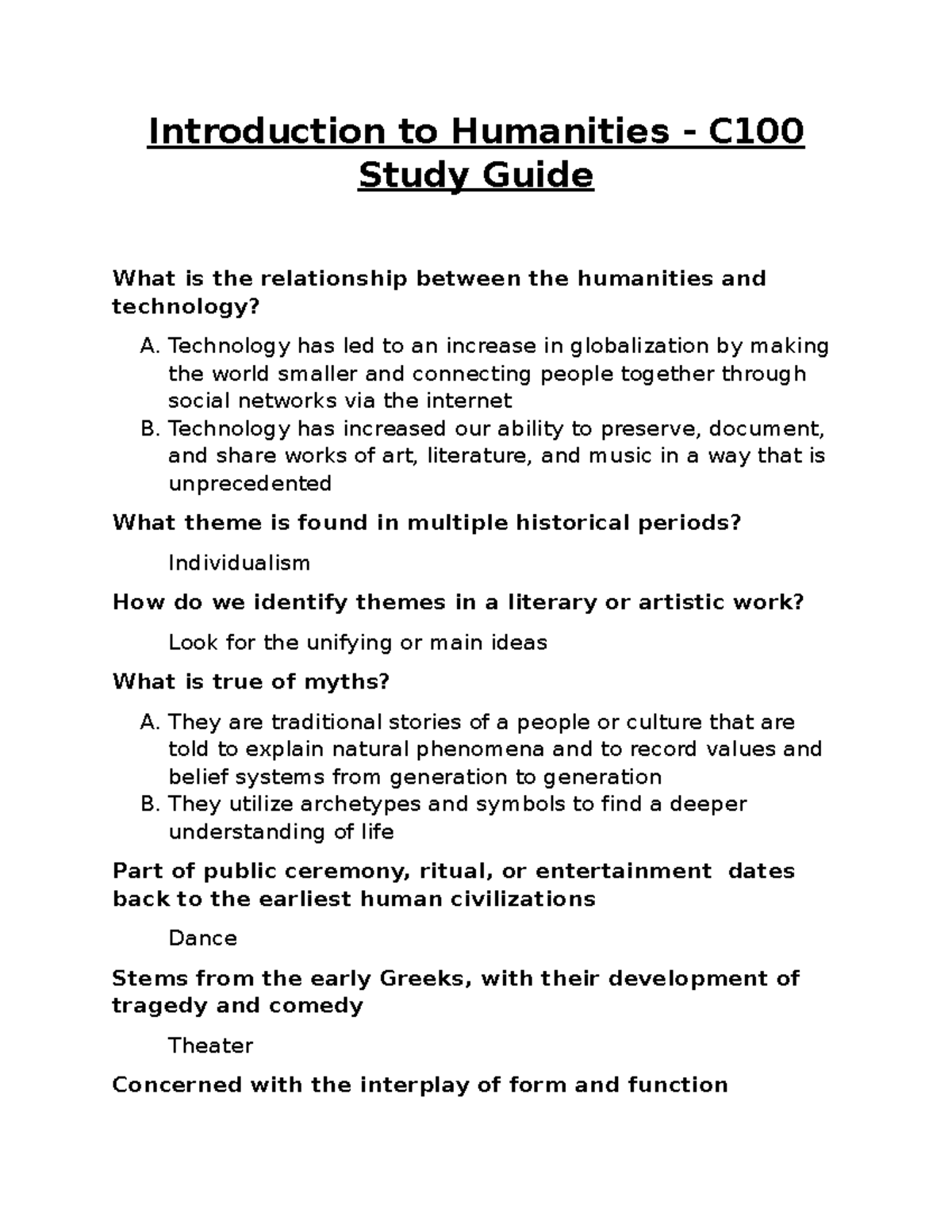
Introductory Humanities Courses: Engaging First-Years.
admin
- 0
Introductory humanities courses play a critical role in shaping first-year students’ academic journeys, offering a pathway into the rich landscape of arts and humanities. As enrollment in the humanities faces challenges, these foundational classes are designed to captivate and engage students, making the importance of humanities education more apparent than ever. By integrating innovative content and interactive learning experiences, the newly redesigned introductory humanities courses aim to inspire students to explore their interests in subjects like literature, philosophy, and art. With a focus on fostering an understanding of human culture, these transformative humanities courses promise to enrich the college humanities curriculum and awaken a passion for the arts and humanities in every learner. Engaging in such courses not only enhances academic skills but also cultivates a deeper appreciation for the stories and ideas that shape our world.
First-year humanities classes serve as an essential entry point for college students, inviting them to delve into the diverse realms of arts and cultural studies. This introductory education offers a unique opportunity for learners to engage with the fundamental questions of human existence and creativity. By fostering participation in courses related to literature, philosophy, and the performing arts, students are encouraged to cultivate critical thinking and reflect on their personal experiences. The redesigned curriculum aims to address the needs of new scholars, empowering them through engaging content that showcases the significance of human expression. Ultimately, these essential courses help bridge the gap between passion and academic inquiry, promoting a vibrant atmosphere of learning.
The Importance of Introductory Humanities Courses
Introductory humanities courses play a pivotal role in shaping students’ understanding of the world around them. These fundamental courses serve as gateways, providing first-year students with the essential tools and frameworks to engage deeply with various aspects of human culture. As emphasized by Dean Sean Kelly, the engagement in the arts and humanities is crucial for fostering critical thinking and reflective skills that are applicable across disciplines. The structured exploration of literature, philosophy, and art allows students to navigate complex human experiences and questions, establishing a strong foundation for their academic journeys.
Moreover, such courses are instrumental in countering the declining interest in arts and humanities seen in recent years. With only about 12 percent of incoming students expressing a sustained interest in these fields, introductory courses must captivate and inspire. The newly designed curriculum aims to resonate with students’ interests and contemporary issues, demonstrating that humanities education is not just relevant, but transformative. By engaging first-year students with compelling, innovative content, educational institutions can foster a generation of critical thinkers who appreciate the significance of narrative, cultural heritage, and ethical discourse.
Engaging First-Year Students Through Innovative Course Design
The initiative to redesign the introductory humanities curriculum is a response to the pressing need to engage first-years more effectively. By introducing nine new courses, the goal is to pivot away from traditional rote learning and instead cultivate an interactive and thought-provoking environment. Professors like Karen Thornber and Richard F. Thomas are leading the charge by offering courses that not only span traditional subjects but also incorporate modern dilemmas such as migration and technology’s impact on humanity. This imaginative approach to course design encourages students to question, analyze, and discuss, actively involving them in their educational process.
Furthermore, the diversity of courses, from ‘Introduction to the Medical and Health Humanities’ to ‘Migration and Border Crossing in Film and Photography’, reflects the aim to connect theoretical concepts with real-world issues. As first-years navigate these subjects, they can explore key cultural narratives and ethical considerations that resonate with today’s societal challenges. This fusion of relevance and critical inquiry creates dynamic learning experiences, reaffirming the importance of humanities education in shaping well-rounded individuals who can engage thoughtfully with an increasingly complex world.
Transformative Experiences in the Arts and Humanities
Transformative humanities courses are designed to inspire students and encourage personal growth through engagement with significant texts and ideas. Dean Kelly’s vision emphasizes that humanities education transcends simple academic pursuits; it aims to foster a deeper appreciation for human experience and creativity. Through courses that challenge students to confront profound philosophical questions and to read critically, participants not only acquire knowledge but also develop empathy and self-awareness. These transformative experiences can dramatically alter students’ trajectories, helping them to discover their passions and potential career paths.
Moreover, courses like ‘Reading for Fiction Writers’ not only teach analytical skills but also emphasize the relationship between reading and writing as a conduit for self-discovery. By examining narratives that explore deep emotional currents, students learn how storytelling shapes identities and cultures. This integrative approach — combining analytical reading with creative expression — aids students in articulating their understandings of humanity within their own lives. Transformative experiences within the humanities curriculum thus prepare students for multifaceted roles in society, equipping them with the skills needed to navigate and contribute to a diverse world.
Encouraging Engagement in the Arts and Humanities
Engagement in the arts and humanities is essential for developing well-rounded individuals capable of critical thought and cultural appreciation. As highlighted in the discussions led by Dean Kelly, fostering this engagement starts early in students’ academic careers, particularly during their first year in college. The newly launched introductory courses prioritize interaction and relevance, ensuring that students feel connected to the material rather than distanced from it. This encourages them to see the arts and humanities not merely as academic subjects but as vital components of their own identities.
Furthermore, by addressing contemporary societal issues and introducing a variety of texts and cultural contexts, the courses challenge students to engage with the material actively. This can lead to more meaningful discussions, deeper insight, and a sustained interest in furthering their studies in the humanities. In doing so, colleges can effectively counteract the declining interest in these fields and inspire students to pursue enriching paths in arts and humanities, underscoring their importance in today’s increasingly interconnected world.
Navigating the Decline in Humanities Enrollment
The decline in humanities enrollment has been a pressing concern among educational institutions, mirroring trends seen across the country. Dean Sean Kelly attributes part of this decline to the decreased emphasis on humanities subjects in high schools, which may leave students feeling unprepared or uninterested. However, with initiatives like the introduction of innovative first-year courses, colleges can address this issue head-on. By presenting humanities as a vibrant and essential field of study, educational institutions can reignite students’ interests in the arts and humanities.
Addressing the challenges posed by previous debates, such as the ‘Canon Wars,’ is a significant step towards revitalizing enrollment in humanities courses. The new courses aim to move beyond historical controversies and focus on preparing students to appreciate diverse perspectives and influences in literature and art. By presenting introductory courses that are imaginative and contemporary, colleges can inspire students to explore the richness of human culture and understand the inherent value of studying humanities, not just for academic success but for personal growth.
The Role of Storytelling in Humanities Education
Storytelling plays a crucial role in humanities education, acting as a lens through which students can explore complex ideas and societal narratives. As outlined by Laura van den Berg and Neel Mukherjee, the interplay between reading and writing offers students the chance to internalize different voices and perspectives. This foundational skill not only enhances their analytical capabilities but also fosters a deeper appreciation for the art of storytelling in various cultures. Engaging with narratives helps students to understand themselves and others, making storytelling a powerful tool in the humanities.
Moreover, by critiquing and discussing stories from diverse authors such as Anton Chekhov and Octavia Butler, students develop critical empathy, which is essential for navigating today’s multifaceted world. The examination of themes, character development, and narrative techniques enhances their understanding of literature while simultaneously encouraging them to reflect on their own experiences. This comprehensive approach to humanities education highlights the importance of storytelling as a transformative experience that resonates beyond the classroom, shaping how students perceive and engage with the world around them.
Redesigning the College Humanities Curriculum
Redesigning the college humanities curriculum is imperative to stimulate student interest and engagement. By taking into consideration the shifting needs and interests of first-year students, educators can create an appealing and relevant curriculum that captivates their imagination. The new introductory courses developed by Dean Kelly and faculty are illustrative of this transformative approach, focusing on contemporary themes while grounding students in the rich traditions of the humanities. Courses that offer an exploration of topics like migration, technology, and identity meet students where they are, elevating their academic experience.
Additionally, curricular redesign involves integrating modern pedagogical practices that encourage active learning and participation. As evidenced by the collaborative nature of courses that combine analytical reading with creative writing, the reimagined curriculum aims to reinforce the interconnectedness that exists within the humanities and the arts. By creating an environment where students can explore their own creativity while honing critical analysis skills, colleges are better positioned to highlight the importance of humanities education and its transformative potential.
Understanding the Connection Between Humanities and Real-World Issues
Understanding the connection between humanities and real-world issues is vital for students’ holistic education. As emphasized in the newly designed introductory courses, topics such as migration, technology’s influence, and ethical considerations in literature provide a unique lens through which students can examine current societal challenges. By contextualizing humanities within relevant contemporary debates, educators reinforce the idea that the arts and humanities are not just historical studies but are essential for interpreting and responding to ongoing global issues.
This connection encourages students to see the relevance of their studies in a broader context, allowing them to appreciate how historical narratives and philosophical inquiries can inform their understanding of present-day dilemmas. As they engage with these course topics, students learn to draw connections between various disciplines and develop the critical skills necessary to address complex issues in the world today. This integrative approach emphasizes the importance of humanities education in developing informed, socially aware individuals who are equipped to contribute meaningfully to society.
Cultivating a Culture of Inquiry in the Humanities
Cultivating a culture of inquiry in the humanities is crucial for fostering a vibrant academic environment where students feel empowered to ask questions and explore diverse perspectives. As highlighted by Dean Sean Kelly, the aim of the introductory humanities courses is not merely to impart knowledge but to ignite a passion for learning that transcends traditional boundaries. By encouraging first-year students to engage in thoughtful discourse and exploration, these courses lay the groundwork for an ongoing commitment to intellectual curiosity throughout their college experience.
This cultural shift emphasizes the significance of inquiry-based learning, where students are invited to grapple with fundamental questions about humanity, ethics, and identity. Through discussions, collaborative projects, and critical analysis, students are encouraged to delve deeply into subjects, fostering a sense of ownership over their educational journeys. In doing so, colleges can create a dynamic learning environment where students thrive academically and personally, ultimately enhancing their appreciation for the humanities and shaping them into engaged citizens.
Frequently Asked Questions
What are introductory humanities courses and why are they important?
Introductory humanities courses are foundational classes designed to introduce first-year students to the fields of arts and humanities. They are important because they cultivate critical thinking, enhance cultural awareness, and foster engagement with significant literature, philosophy, and art forms. These courses emphasize the value of humanities education, encouraging students to explore human experiences and societal issues.
How can first-year humanities courses influence a student’s academic journey?
First-year humanities courses can significantly influence a student’s academic journey by providing essential skills in analysis and interpretation, while encouraging self-exploration and critical engagement with diverse texts and ideas. Many students discover their passions in arts and humanities through transformative introductory courses, laying a solid foundation for further study in these disciplines.
What types of topics are covered in first-year humanities courses?
First-year humanities courses cover a wide range of topics, including literature, philosophy, art, and cultural studies. For instance, courses like ‘Introduction to the Medical and Health Humanities’ and ‘Culture in Context’ allow students to explore the intersection of human experiences and societal influences, enhancing their understanding of the importance of humanities education.
What innovations have been introduced in the college humanities curriculum recently?
Recent innovations in the college humanities curriculum include the introduction of nine new introductory courses aimed at engaging students more effectively. These courses are designed to resonate with first-year students, addressing current interests and societal challenges while promoting greater engagement in arts and humanities studies.
What is the significance of transformative humanities courses for first-year students?
Transformative humanities courses are significant for first-year students because they provide a platform for personal and intellectual growth. By exploring fundamental questions about existence, society, and culture, these courses aim to inspire students and help them appreciate the intrinsic value of humanities beyond mere academic achievement.
How do introductory humanities courses support engagement in arts and humanities among students?
Introductory humanities courses support engagement by offering diverse and relevant content that reflects contemporary issues and interests. Through active participation in discussions and projects, students develop a deeper connection to the arts and humanities, thereby reversing trends of disengagement and low enrollment in these fields.
Why is there a decline in enrollment in introductory humanities courses?
The decline in enrollment in introductory humanities courses is attributed to a lack of emphasis on these subjects in secondary education and a disconnect between course offerings and student interests. Many first-year students enter college with a fleeting interest in humanities, which often wanes by the time they declare their majors. The new course initiatives aim to address these concerns by offering compelling content.
Who teaches introductory humanities courses and what backgrounds do they have?
Introductory humanities courses are taught by diverse faculty members with extensive expertise in their respective fields. Professors from various disciplines, including literature, philosophy, and cultural studies, bring their unique perspectives and experiences to the classroom, enriching students’ learning experiences and fostering a comprehensive understanding of the humanities.
What role does literature play in the introductory humanities curriculum?
Literature plays a crucial role in the introductory humanities curriculum as it serves as a medium for exploring human experiences, emotions, and social contexts. Courses that focus on reading literature not only develop students’ analytical skills but also enhance their appreciation for narrative and storytelling, which are essential to understanding the human condition.
How can engaging with introductory humanities courses benefit students beyond college?
Engaging with introductory humanities courses benefits students beyond college by equipping them with critical thinking skills, empathy, and cultural understanding. These courses foster an ability to analyze complex issues and appreciate diverse perspectives, preparing students for a variety of careers as well as for meaningful participation in society.
| Key Point | Details |
|---|---|
| Introduction of New Courses | Nine new introductory courses in Arts and Humanities to engage first-year students, aiming to counteract declining enrollment in these fields. |
| Dean Sean Kelly’s Initiative | Kelly initiated this course redesign to better captivate students and rekindle their interest in Humanities. |
| High School Preparation Issues | Lack of emphasis on Arts and Humanities in American high schools leads to lower enrollment after initial interest. |
| Transformative Course Goals | Courses aim to transform students’ understanding of Humanities by engaging with fundamental questions about humanity and ambition. |
| Successful Models | Philosophy Department’s success by emphasizing human relevance over Ph.D. prep, inspiring course designs across departments. |
| Unique Course Offerings | Courses like ‘Introduction to the Medical and Health Humanities’ and ‘Reading for Fiction Writers’ designed to integrate various approaches to humanities. |
| Engagement Over Practicality | Focus on intrinsic vs. instrumental value of humanities; critical thinking through literature, philosophy, and art. |
Summary
Introductory humanities courses aim to enhance students’ engagement with core aspects of human culture and thought. As demonstrated by Dean Sean Kelly’s innovative approach at Harvard, these courses are designed to inspire first-year students to delve deeper into the humanities. By introducing new, captivating curricula, these courses strive to rekindle interest in art, literature, and philosophy while highlighting their indispensable value in understanding human existence. Through this initiative, students will not only learn the fundamental concepts of the humanities but also develop critical thinking skills that are essential in a rapidly changing world.

